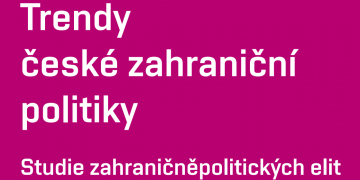Czech Republic’s public and expert discourse on European integration is habitually portrayed as one of the most Eurosceptical among the member states. Recent survey suggests this might be nothing but a myth.
It has become a conventional wisdom to describe the Czech foreign and European policy as Eurosceptical and Atlanticist. The prominence of President Václav Klaus in the self-titled “Eurorealist” circles, his nerve-rattling hesitation to ratify the Lisbon Treaty, as well as Prague’s close ties to Washington during the Bush administration all contributed to this image. Nevertheless, recent edition of Eurobarometer found Czech public opinion rather indifferent than negative towards the EU with only 16 % perceiving EU membership as a bad thing, well below the levels for most of the members, including Germany and France. Is it then the elites who embrace anti-European sentiments?
Rather not, according to a recent survey conducted by the Association for International Affairs among more than a hundred Czech politicians, diplomats, top-ranking officials and experts. The EU was unequivocally labelled the most important international organization for the Czech Republic. Not a single respondent doubted this point, and nine in ten chose “important” over “somewhat important” when selecting their reply. Moreover, more than eighty per cent are persuaded that the importance of the Union will likely grow in the following ten years – a number far above the level for any other international institution.
The outlook for the future development of the European Union is generally positive, including cautious optimism regarding the situation in the euro area which topped the list of current issues on the EU agenda. Less than one out of ten respondents considered the possibility of the Eurozone’s disintegration likely or somewhat likely. On the other hand, Czech foreign policy elites are pessimistic in at least one regard, that of the possibility of the Czech Republic’s accession to the common currency: only one in five can imagine this happening within the next five years.
How about the future of European integration as such? No clear prevailing trend can be identified from the responses. A significant majority rejects (but only 8 % resolutely) the possibility that joint institutions might be weakened and European politics renationalized. Arguably, the most likely path is a differentiated approach in the framework of a ‘multi-speed Europe’, in which both big member states and supranational institutions will play a key role.
The popular story of the Czech Republic as a “last bastion of Atlanticism” does not fit very well either. Bilateral relations with the United States were graded with an equivalent of “B”, which placed the superpower behind Slovakia, Germany and Poland. Nor do the Czech elites feel abandoned by the Obama administration: the outlook for the following years is clearly positive despite the parallel expectation of an inevitable weakening of the transatlantic bond.
The evidence gathered by the survey does not suggest that Czech foreign policy elites have embraced Europe wholeheartedly, or that Prague’s positions towards the EU and vis-à-vis particular European policies are unproblematic. Neither is the case and the Czech Republic will most likely continue to cause a stir on many specific occasions. Still, the survey effectively debunks the myth of deep-seated, unrepentant Czech Euroscepticism and reveals a scale of much more nuanced and rational elite opinions. Makers of Czech foreign policy may not be especially enthusiastic about the European enterprise but obviously approach the issue with clear-eyed realism and general sense of support.

